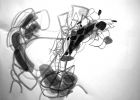Flusser Studies 12 - November 2011
Mediengeschichtliche Strömungen: das vorgefundene Prag
The short section included in this issue of Flusser Studies is an excerpt from my dissertation. It is part of the first chapter, a biography of Flusser. The text attempts to sketch a few of the countless influences Prague and Central European cultural traditions have exerted on the young Vilém Flusser. It is preceded by a section on his Prague origins. The dissertation also includes a second, related, excursus titled “Currents of Media History II. – The Prague Flusser Left behind.” The dissertation was conceived as a general view on Flusser’s work and life that could also serve as an introduction to his thought. From my point of view, Flusser should be considered, above all, a phenomenologist of different forms of communication.
The dissertation begins with a biographical introduction followed by a study of various aspects central to his thinking: media, code, apparatus, and dialogue. Furthermore, the history of his reception is dealt with extensively. The phenomenology of media, the philosophy of communication, and questions of cultural anthropology are reinterpreted within a Czech-German and Jewish Habsburg-Austrian environment that proved to be a fertile ground for the development of Flusser’s interests. In fact, Flusser can be regarded as one of the last representatives of the short but amazingly rich intellectual blossoming of the Jewish-Czech-German culture that was abruptly truncated by the German invasion of Prague in the spring of 1939. Taking into account the massive impact these cultural traditions of Old Central Europe had on Flusser, I argue that, in the development of Flusser’s thinking, a projection of Prague’s past onto the Brazilian future is recognizable. The source of this projection also sheds light on the consequences Flusser drew from the failure of the “Brazil Project” in the early 1970s.
Los fantasmas de Flusser: de magia, comunicación e imagen visual
This paper focuses on the relation between technical image and magic, that is, between the post-historic and the post-magic era and the way it is treated in the philosophy of Vilém Flusser. The image as phantasmagoria is translated into a virtual spectrality, a game of signs and a circular concatenation as in the idea of the eternal return.
Flusser’s Moral Theory – Philosophy as Melancholy
~Flusser is a moral philosopher worthy of careful study and criticism. This paper is my attempt to critically investigate this crucial, moral, aspect of his writings. To focus attention on the significance of his moral theory, I shall compare Flusser with Hegel, a comparison that is not accidental as both philosophers tried to explain “evil” in dialectical terms by elaborating on myths derived from the Book of Genesis. Hegel discusses the issue in his version of the Story of the Fall of Man and Flusser does so in his interpretation of the Story of Creation. The contribution of both is obviously important, but I think Flusser’s narrative can achieve what Hegel set out as his aim but failed to accomplish. Flusser’s understanding of evil reflects on and fosters the exercise of a particular moral virtue, namely, modesty. There is little doubt that, for Flusser, the moral individual lives a heroic life. Is Flusser providing “the cure” to evil? There is no way of knowing it in advance. In the last analysis, this is a matter for each reader to decide.
Chance and Improbability
This text discusses Flusser’s thinking regarding the ‘technical image’ in relation to a recent artist’s book, Accidental Journey. The book is nominally about the moon and astronomy, and contains images, factual and fictional texts, documents of my own and others’ research, travels, illustrations, scientific diagrams, and so on. Also presented is an excerpt from the book together with a selected quotation from an unpublished work by Flusser, ‘Between the probable and the impossible’, (Vilém Flusser Archiv, number 2723). Often with art it is not clear what goes into formulating and making a work. The research that feeds into the development of the work remains crucial but is often undisclosed. Acting as a repository for the unexpected, the book in this sense was an attempt to enable these things to see the light of day. Flusser’s thinking is important not only towards developing a critical understanding and formulation of theory and a reflection on the practical processes at work, but also in terms of the nature of research itself: that is, the potentialities that proliferate through looking and searching, which hint at a realm of the possible as opposed to the probable. The text is not intended to situate Flusser’s writing other than in terms of my own thinking and the processes that lead to making work, in whatever form that may take.
O belo è elevado, o agradavel é conservador
This essay explores the relation between art and culture by taking into account the profound ambiguity inherent in any artwork. This very ambiguity makes it possible to understand art works as part of a cultural process and as modifiers of this process.
A arte e o vazio da cultura
This essay explores the relation between art and culture by taking into account the profound ambiguity inherent in any artwork. This very ambiguity makes it possible to understand art works as part of a cultural process and as modifiers of this process.
Palavras e Signos: as estéticas da significação em Deleuze e Flusser
The aim of this work is to investigate the process through which we can produce meaning. In order to achieve such a goal, it is our intent to compare - in such a way that can be described as the friction between two pieces of wood - the ideas of Flusser and Deleuze on the subject. Therefore, the results achieved by the texts Língua e Realidade and Proust et les signes will be characterized in their differences and similarities in order to describe the process of making sense as a poetic and an aesthetic gesture. Both of the authors found their reflection about word/sign in a space division between worlds of signs and cultural types of language. This contribution wants to journey through such worlds and countries not only to make a map of Flusser and Deleuze’s ideas, but also to find space divisions of our own. In this sense, the cities of Jerusalem and Athena were discovered as two different ways to think about language – and the possibility (or not) of a communication between these two tracks are the main opposition of the ideas studied here.
Look Again: The influence of Vilém Flusser on Brazilian photographer Rosângela Rennó
Brazilian artist Rosângela Rennó refuses to take “new” photographs, preferring instead to rework the mass of existing images. Her use of appropriation and her attitude towards this method are remarkably similar to international postmodern appropriation practices. However, she reached this parallel position through her exposure to different theories and influences. Her decision to abandon the act of photography and to appropriate photographs and photographic objects was influenced by the book Towards a Philosophy of Photography by Czech-Brazilian philosopher Vilém Flusser, amongst other theories that were current in Brazil at the time. The ideas of Flusser have not been extensively discussed in Brazilian art history. This article aims to evaluate Rennó’s art in relation to the fledgling postmodern debates generated in Brazil by Flusser. It also considers how Flusser’s particular theories directly influenced Rennó’s art. Rennó takes from Flusser the idea of the need for visual re-education, i.e., that viewers should be provoked into looking. Rennó’s response is to create images that are hard to see. Paradoxically, perhaps, she embraces opacity in order to generate visual engagement.
Flusser an die Schule! Die Essays im Ethikunterricht
Does it make any sense to teach Vilém Flusser’s essays in the advanced courses of a secondary school? While all over Europe school subjects have increasingly been restricted by a formal frame, some precautions have to be taken in the interest of Flusser’s method and message. As a pioneer in the newly established subject of Ethics in the federal state of Hessen/Germany, the author tested the essays without a strict curriculum for more than six years. He gives an overview of general conditions at the school and offers a vivid personal record of his experiences. He then deals with Flusser’s phenomenological style and intellectual challenges for students and teachers alike. As this essay has a practical purpose, too, he shows the crucial points of relating Flusser’s way of thinking. Such training is worth the effort in the political context of 2011, when citizens all over the world are trying to regain some influence on political and economic structures. In the second part, the author presents a dozen of short essays and examines their interrelation, as they share the same subject. They center on Flusser’s well-known conviction that the exilee should consider himself part of an avant-garde. Some useful hints to a sequel or an alternative approach are provided. Excerpts from four student texts have also been included.
Kopfkino – nach Flusser
In this paper I reflect on pictures. Kopfkino (cinema in the head) stands for a chain of associations that arises in my mind because of a pictorial impulse. By adopting many different points of view, I can modify and broaden those chains of associations and include new pictures or change old concepts. By referring to an example for such a Kopfkino, I explore how I can actively influence my Kopfkino with the help of Flusser’s writings.
Zukunftsvision ohne Schrift
Imagine our world without any written letters. Since we live in a rapidly changing world dominated by computers, it is exciting to think about what the world would be like in about thirty years from now. Thinking only thirty years back in history, the personal computer was in its infancy, used by very few people. Nowadays, more than sixty percent of private homes in Germany own at least one personal computer. This development relates to Flusser's remark that there will be other ways of communication beyond writing, and his remark encouraged me to come up with "Levi Melfuss," a student who lives in a future in which text-based communication will vanish in favor of digital communication.
Zwischenmenschliche Begegnung
My contribution to Flusser Studies is a photo-series which expresses my doubt about the ability of two people meeting face to face to actually communicate with each other. In addition, there are a few considerations taken from Vilém Flusser’s book about communicology.
![Rosângela Rennó, São Paulo, from the series Corpo da alma [Body of soul], 2003-2011](https://flusserstudies.net/sites/www.flusserstudies.net/files/styles/article_first/public/media/images/sao-paulo.jpg?itok=I75SlpCL)
![Rosângela Rennó, Rio de Janeiro, from the series Corpo da alma [Body of soul], 2003-2011](https://flusserstudies.net/sites/www.flusserstudies.net/files/styles/article_first/public/media/images/rio-de-janeiro.jpg?itok=EBSRhh9T)



